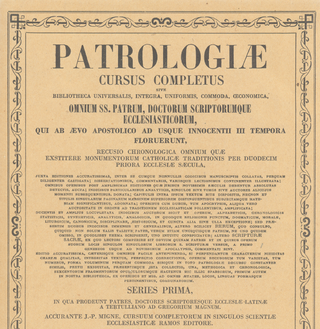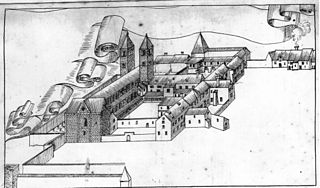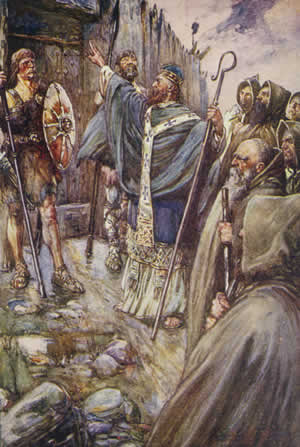Scotus or SCOTUS may refer to:
- Supreme Court of the United States
- Scotus Academy, Edinburgh, Scotland
- SCOTUSblog
- Scotus Central Catholic High School, Nebraska
- Scotus College, Glasgow, Scotland
Scotus or SCOTUS may refer to:

Year 1088 (MLXXXVIII) was a leap year starting on Saturday of the Julian calendar.
Marianus Scotus was an Irish monk and chronicler. He authored the Chronica Clara, a history of the world.
Johannes Scotus or Skotus, John Scotus, or John the Scot may refer to:

The Patrologia Latina is an enormous collection of the writings of the Church Fathers and other ecclesiastical writers published by Jacques-Paul Migne between 1841 and 1855, with indices published between 1862 and 1865. It is also known as the Latin series as it formed one half of Migne's Patrologiae Cursus Completus, the other part being the Patrologia Graeca of patristic and medieval Greek works with their medieval Latin translations.
The Bishop of Dunkeld is the ecclesiastical head of the Diocese of Dunkeld, one of the largest and more important of Scotland's 13 medieval bishoprics, whose first recorded bishop is an early 12th-century cleric named Cormac. However, the first known abbot dates to the 10th century, and it is often assumed that in Scotland in the period before the 12th century, the roles of both bishop and abbot were one and the same. The Bishopric of Dunkeld ceased to exist as a Catholic institution after the Scottish Reformation but continued as a royal institution into the 17th century. The diocese was restored by Pope Leo XIII on 4 March 1878; it is now based in the city of Dundee.
John Scotus Eriugena, also known as Johannes Scotus Erigena, John the Scot, or John the Irish-born was an Irish Neoplatonist philosopher, theologian and poet of the Early Middle Ages. Bertrand Russell dubbed him "the most astonishing person of the ninth century". The Stanford Encyclopedia of Philosophy states that he "is the most significant Irish intellectual of the early monastic period. He is generally recognized to be both the outstanding philosopher of the Carolingian era and of the whole period of Latin philosophy stretching from Boethius to Anselm".
The Lord Chancellor of Scotland, formally the Lord High Chancellor, was a Great Officer of State in the Kingdom of Scotland.
David the Scot was a Welsh or Irish cleric who was Bishop of Bangor from 1120 to 1138.

The Scots Monastery is the former Benedictine Abbey of St James (Jakobskirche) in Regensburg, Germany. It was founded in the 11th century by Irish missionaries and for most of its history was in the hands of first Irish, then Scottish monks. In Middle Latin, Scotti meant Gaels, not differentiating Ireland from Scotland, so that the term Schottenstift dates from the Irish period. The full official name of the actual church, the most prominent building within the abbey complex, is Die irische Benediktinerklosterkirche St. Jakob und St. Gertrud.

The Hiberno-Scottish mission was a series of expeditions in the 6th and 7th centuries by Gaelic missionaries originating from Ireland that spread Celtic Christianity in Scotland, Wales, England and Merovingian France. Catholic Christianity spread first within Ireland. Since the 8th and 9th centuries, these early missions were called 'Celtic Christianity'.

The Bishop of St. Andrews was the ecclesiastical head of the Diocese of St Andrews in the Catholic Church and then, from 14 August 1472, as Archbishop of St Andrews, the Archdiocese of St Andrews.
Sedulius Scotus or Scottus was an Irish monk, teacher, Latin grammarian, and scriptural commentator who lived in the 9th century. During the reign of the Emperor Lothair (840–855), he was one of a colony of Irish teachers at Liège. Sedulius is sometimes called Sedulius the Younger, to distinguish him from Coelius Sedulius. The usual Irish form of the name is Siadhal, but he appears to have been called Suadbar. It is quite probable that towards the end of his days he went to Milan, following the example of his countryman Dungal, who established a school at Pavia. When and where he died is unknown.
John Scotus was a 12th-century bishop of St. Andrews and Dunkeld.
David Scotus was a Gaelic chronicler who died in 1139.
Aaron Scotus was an Irish abbot and musician, fl. late 10th century – 14 December 1052.
Marianus Scotus of Regensburg, born Muiredach mac Robartaig, was an Irish abbot and scribe.
Joseph or Josephus Scottus, called the Deacon, was an Irish scholar, diplomat, poet, and ecclesiastic, a figure in the Carolingian Renaissance. He has been cited as an early example of "the scholar in public life".
Marianus is a male name, formerly an ancient Roman family name, derived from Marius. Marianus may refer to:
Regensburg also called Ratisbon in English and Ratisbonne in French, a German city in Bavaria, south-east Germany

The Saint James Scots Monastery in Constance, Germany was a Benedictine monastery, which, like the other Scots monasteries, was founded by Irish monks in the course of the second phase of the Hiberno-Scottish mission. It was situated to the west of the historic city wall near the banks of the Rhine on what is known today as Schottenstraße.